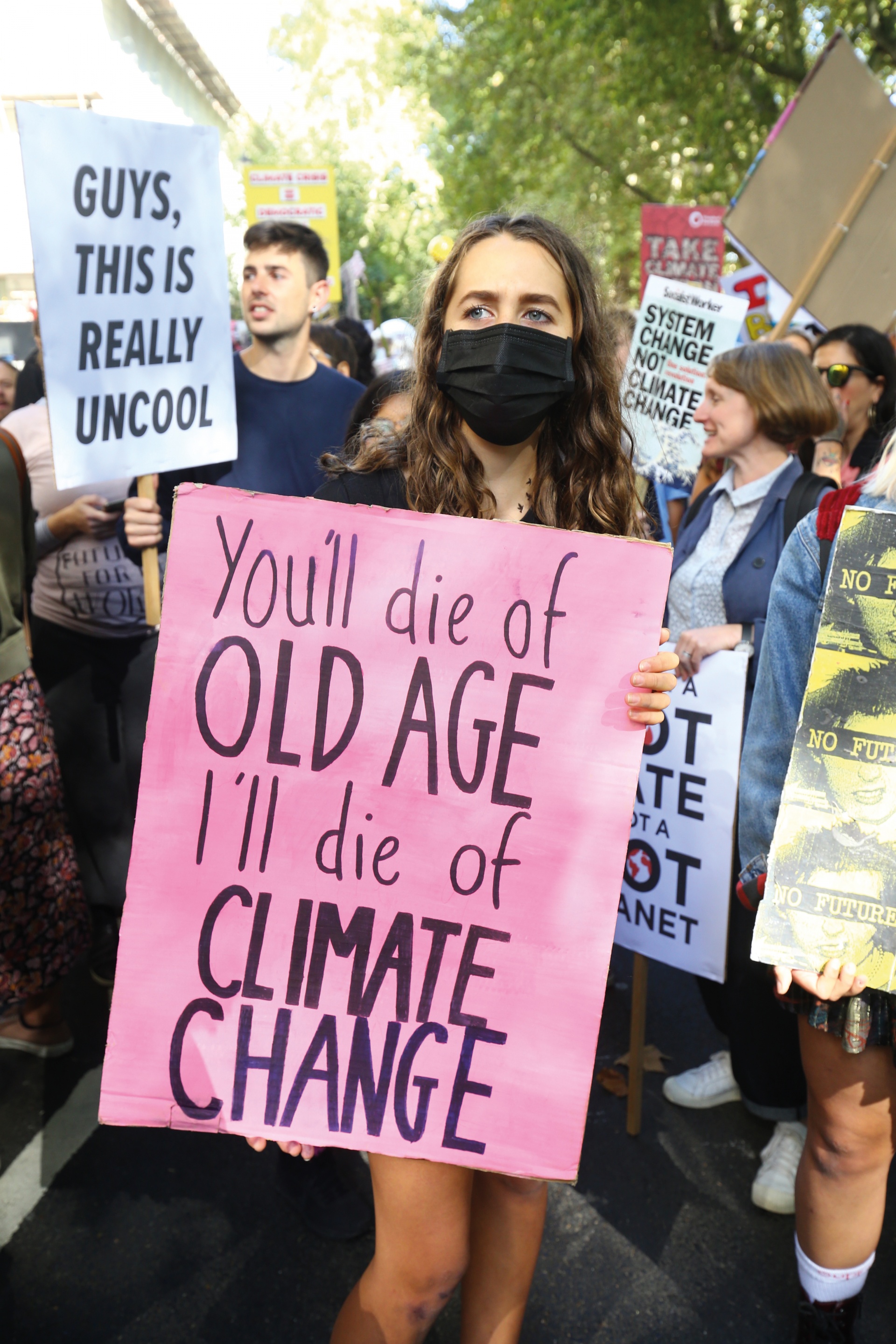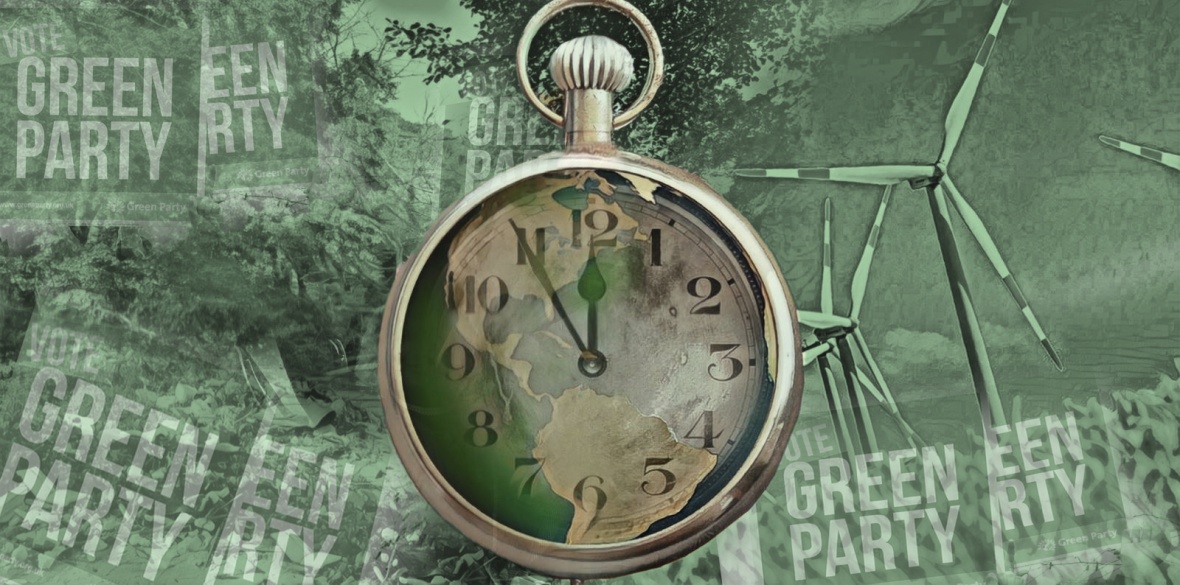This is the last article you can read this month
You can read more article this month
You can read more articles this month
Sorry your limit is up for this month
Reset on:
Please help support the Morning Star by subscribing here
WITH 50 years on the clock, and the global state of nature rapidly degrading, it is time for the Green Party, to which both of us belong, to take stock.
The accomplishments of the party are certainly not to be sniffed at and are well deserving of celebration.
Greens are now a major force in council elections across most of the country, offering a much-needed departure from the dominant parties while also being part of a collective national group in a way that independent councillors cannot be.
Against all the odds, we have an elected MP, Caroline Lucas, who often receives awards for being one of the best MPs in the country.
But, the discrepancy between the party’s accomplishments and the enormity of climate breakdown is now terrifyingly obvious. The party’s fundamental goal, to protect and safeguard a sustainable environment for us and our children, remains a long way off.
To what extent (if any) can we confidently say that the party will be in a position to safeguard the environment before ecological degradation becomes too great and the party’s fundamental aim will be irrefutably unachievable?
We must now be honest about this if we want to reap the rewards from what comes with authentically facing the truth — rewards which became obvious with the breakthroughs into the public consciousness of XR and of the youth climate strikers in 2019.
If we accept the key point here — that it is now effectively impossible that the party, following the same trajectory it has followed for the last 50 years, or even speeding up a fair bit, will be able to seize enough political power quickly enough to prevent the very worst outcomes of climate breakdown — then why has the party not changed tack?
It is high time to ask this uncomfortable question: is it wise to chase electoral success directly through conventional routes as a primary strategy, or should we also seek alternative routes for achieving the fundamental aim of the party?
Currently, the leadership is focusing on electoral success and is committed to trying to get five MPs at the next general election.
We yearn for this strategy to succeed, and we are personally committed to directly helping in the objective of getting new Green MPs elected, especially in the couple of seats where Green contenders are up against Conservative incumbents who will now be unprecedentedly weak.
But we must be permitted to critically assess the suitability and credibility of this strategy, which we think is flawed for two substantial reasons: it is unrealistic, and more importantly, it would still drastically fail to embody the scale of change needed even if successful.
On the first point, how confident can one be that we won’t get five Green MPs elected at the next election?
The answer is simple: in most cases with the Labour Party resurgent in the polls, potential or actual Green target seats wouldn’t realistically be in a position to move to Green.
There are more Green target seats aiming at unseating Labour than Conservative incumbents.
Bottom line: it is very hard indeed to imagine the Greens beating a resurgent Labour in target seats, at the coming general election. Even in Bristol, it is going to be very hard.
Turning to the second point: even if the fairly unrealistic target of five or more Green MPs was achieved in the next election, without wider societal change, the difference this will make to the ecological predicament would probably be relatively small.
Increased representation in Parliament is by all means a good thing, but let’s not forget that other parties have been far bigger and still been fairly unsuccessful in the Westminster arena.
The SNP now boasts 45 MPs, but still cannot push through their central policy of a vote on Scottish independence.
The Lib Dems have had more than five seats for decades; they still haven’t achieved electoral reform or much else.
Thus, even the unlikely scenario of increasing the number of Green MPs five-fold would do relatively little to safeguard a survivable common future.
Perhaps five MPs would make the Greens a more attractive party to form a coalition (or a confidence and supply arrangement) with, and thus the Greens could make it into government.
However, it must now be obvious that the possibility of reaching government by being the minority party won’t be a silver bullet in protecting the environment.
Recent coalitions have seen the smaller party unable to safeguard their most central issues (first the Lib Dems in 2010, and later the DUP in 2017), damaging their image to their voter base and resulting in a poor performance at the next election.
Again, just to be clear, we absolutely don’t want any of this to be misconstrued as an attack on the party, of which we are proud members. The party is likely to make significant gains at the May local elections; which is exciting and important.
Nor should any of this be taken as an attack on the current leadership, Carla Denyer and our long-time friend and colleague Adrian Ramsay, who have both performed and will continue to perform their roles as co-leaders with passion and integrity.
Our aim here is simply to raise some questions, and be honest about the answers. What change do we now need? Are our current strategies realistic? How can we play to our strengths to give us the best shot at achieving our aims?
Similarly, we certainly do not want to be taken as defeatists. This piece should certainly not provoke a resigning shrug; we do not want you to think “Oh well, we gave it our best shot” before giving up on pushing for change.
On the contrary, the tenor of this piece is one of dark optimism that believes that profound change is still possible and that the Green Party can — and quite likely will — play a vital role in shaping that change.
Indeed, we believe that the approach we offer is the best way to positively involve the party in effecting the biggest change possible.
But the way that we can now midwife transformative change is not as direct and straightforward as we had all hoped it might be.
If we were to cast an honest shadow of realistic doubt over the suitability of the current party strategy, what could take its place? How can we best utilise the party’s assets to make the biggest difference?

Let us first assess the key weaknesses of the Greens compared to other parties, before highlighting their unique strengths. A good strategy would seek to best utilise these strengths.
What assets are the Greens lacking compared to other parties? Firstly, funding. The party receives far less funding than the Conservatives, Labour and the Lib Dems.
We also lack strong voter compactness beyond Brighton. Having voters geographically spread out hurts the party in a first-past-the-post system.
Then, what assets does the party have that others don’t? It is a trusted voice on an identifiable and crucial moral problem (the problem of eco-breakdown).
It is generally popular with the public. Britons are the most favourable and least unfavourable towards the Greens than any of the other main four parties. Indeed, the Greens are the only party that at least half the population are not unfavourable towards.
What if we were to parlay our popularity and trustiness into something unprecedented? What if we were to come clean that it is too late to stay in the semi-safe zone below 1.5°C, that it is too late to avoid focusing now on adaptation, resilience-building, preparedness and disaster response, as much as on mitigation and prevention? What if we were to act as the trusted messengers that we are?
What if we were to come clean that it is no longer “five minutes to midnight” and that the world has run out of time to get things sorted and safe by electing Greens — that that needed to happen a generation or more ago if there was to be any kind of smooth transition.
The “five minutes to midnight” messaging and hopes that the electoral path through the parliamentary institutions was going to be enough to save us were appropriate 30 years ago, and to that end, the Green’s previous strategy certainly made basic sense.
But we needed Green governments across the world at least a generation ago. The fact that we have not had them and are virtually certain to not have them this decade (certainly not in this country) has to have consequences.
We are not alone in such an outlook. Michael Benfield, who co-founded the party back in the early 1970s, has gone further than us, recently admitting to the BBC that he believes “the battle for the world’s environmental survival is, at this moment, lost.”
Benfield’s take should be viewed as the not unreasonable valediction of someone who has earned the right to be listened to. More importantly, it should be seen as the opening of a conversation.
There will either be a slow death of optimism accompanied by the kind of doomism that Benfield might be heard as proclaiming (although he leaves a crack open in the doorway if one listens carefully to his words), or there will be a more creative response.
The latter is what we see this as opening the door to. Now that the taboo on contemplating potential — likely — collapse is ebbing away and major figures in the party’s history have begun publicly recognising it as looming (many have expressed such sentiment in private), it must be time for our strategy to reflect such truth — that at present we are headed for eco-collapse, that the party is not going to stop this via the parliamentary road if we carry on just asking people to turn to our policies as we run out of road, and that a mighty power will now be needed to facilitate a massive course correction and possibly prevent complete catastrophe.
It is now “#fivePASTmidnight.” What if we were to actually be courageous enough to admit this?
Sooner or later, the party will probably adopt something like the strategy we recommend here: the strategy of telling the whole truth and acting accordingly. But if it is sooner, then we are buying ourselves collectively more response time. And response time matters. Especially in an emergency.
And here’s the beautiful possibility that will be created if we are brave enough to tell the whole truth outlined in this article — including the bitter truth that we ourselves are not about to come to the rescue through the ballot box.
Then, paradoxically, we open up the one conceivable route by which politics in this country could be turned on its head — and we could be the beneficiaries.
Truth, authenticity, and emotionally congruent disclosure, is a mighty power. When people hear us being honest enough to admit defeat, and honest enough fully to share our fears and our assessment, then, paradoxically, they might finally be impressed enough — at actually encountering that most vanishingly non-existent of beasts, an honest politician — to turn to us in numbers and grant us our biggest victories yet, after all.
Parts of this article are adapted from a longer piece that appeared at www.greenworld.org.uk.












